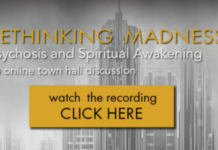Yes, I Hear Voices, But No, I Don’t Want You to Call Me Mentally...
In this piece for The Independent, Rachel Waddingham describes her experience with hearing voices as well as learning to live with and understand her voices.
"When...
Acceptance and Commitment Therapy for Psychosis: A Valuable Contribution Despite Major Flaws
The core of Acceptance and Commitment Therapy, or ACT, is the idea of simply accepting, rather than trying to get rid of, disturbing or unwanted inner experiences like anxiety or voices, and then refocusing on a commitment to take action toward personally chosen values regardless of whether that seems to make the unwanted experiences increase or decrease. This idea is consistent with the emphasis in the recovery movement of finding a way to live a valued life despite any ongoing problems, but ACT has value because of the unique and effective strategies it offers to help people make this shift.
“Canadian Patients Fight Forced Electroshock”
"A retired nurse, a Harvard-educated musician and others sued British Columbia this week, claiming it forcibly subjects mental health patients to electroconvulsive therapy and...
Institutional Psychotherapy in France: An Interview
In this interview for Hidden Persuaders, Camille Robcis discusses institutional psychotherapy, a French psychiatric reform movement that began during the Second World War. Robcis explains...
From Protesting to Taking Over: Using Education to Change Mental Health Care
As we develop critical awareness about the mental health “treatments” that don’t work and that often make things much worse, the question inevitably comes up, what can those who want to be helpful be doing instead?
The Sound of Madness
From Harper's Magazine: People who hear positive, encouraging voices often seen as spiritual guides or messages and people diagnosed with schizophrenia are usually thought of as...
A Life Hearing Voices: How I Manage Auditory Hallucinations
Shanika Ranasinghe speaks to ELLE about her experience of hearing voices, the stigma attached to voice-hearing and the tools that have helped her cope, such...
Why Getting out of our Head is Good for us
From Philosophy for Life: Though often pathologized by psychiatry and western science, spiritual experiences and altered states of consciousness can actually be highly therapeutic and valuable.
"Having...
Not Everyone Wants to Silence the Voices in Their Heads
From Science of Us: There seems to be a growing interest in the concept of healthy voice-hearing. The idea that hearing voices may not be...
Group Mindfulness Shows Promise Reducing Depression Associated with Hearing Voices
A new study out of Kings College London found that twelve sessions of a group mindfulness-based therapy relieved distress associated with hearing voices while reducing depression over the long-term. The person-based cognitive therapy (PBCT) intervention had significant effects on depression, voice distress, voice controllability and overall recovery.
Hearing Voices May Actually Be a Good Thing
From CBS Denver: A new study suggests that people who hear voices may have an increased ability to decode complex sound waves.
"The scientists studied a...
Childhood Trauma and Auditory Verbal Hallucinations
Researchers in the Netherlands compared childhood trauma and auditory verbal hallucinations (AVH) in 127 non-psychotic individuals with frequent AVH, healthy controls, and 100 psychotic...
The Elephant in the Room
From Discursive of Tunbridge Wells: Psychologist Rufus May speaks about the often overlooked role of racism in the mental health system. People of color are...
How Can We Talk About Difficult Experiences Non-Violently?
I really valued the massive Melbourne Hearing Voices conference last week. The theme of reconciliation between voice hearers and mental health workers was a powerful one. This emphasis on creating understanding conversations at the conference was encouraged with dialogues between people on specific subjects - medication, spirituality, psychological approaches to voices etc. - rather than keynotes. It seemed a move away from presentations of competing knowledges, toward a more dialogical conference; a respectful exchange of different viewpoints, feelings and values. When you have a range of views in a presentation it’s less easy to adopt a “good guys vs. bad guys” mentality; you start to see the complexities in more relief. The surprise for me was that I liked it.
Webinar Discussion – Rethinking Madness
A free recording of last week's webinar anchored to Phil Borges' Crazywise, a documentary exploring alternative approaches to mental health, is now available. Over 4,000 people...
Madness Radio: Eleanor Longden on Voices and Trauma
Hearing distressing voices is highly correlated with traumatic experiences, and many people report that their first experience with distressing voices occurs after a trauma....
More Experience Hallucinations Than Previously Thought
From RTÉ: A recent study found that over 4 percent of all people have experienced hallucinations, which is far more than had previously been thought. Contrary...
Confusion Over Antipsychotic Dosing Data in RAISE Study
Yesterday, the New York Times reported that schizophrenia patients in an experimental treatment program (RAISE) who experienced better outcomes had been on lower doses of antipsychotics than normal. However, the article published in the American Journal of Psychiatry on Tuesday did not divulge any data on the varying antipsychotic drug doses in the different study groups.
A Glimpse Inside US Mental Health Detention Centre
From The Sun: New York photographer Lili Holzer-Glier was recently allowed inside the Cook County Department of Corrections in Chicago, where 35 percent of inmates...
Guiding Voices, Trauma-Induced Voices
I have facilitated support groups and worked one-on-one with those who hear voices for nearly 10 years.. The insights I've come to from my own experience have often facilitated understanding for others. Here is what I have learned from my experience of hearing voices.
Anyone Can Be Trained to Hallucinate
From Flipboard: In a recent study on auditory hallucinations, all participants — not just those who had been diagnosed with psychosis — experienced conditioned hallucinations. The study...
Long-Term Social Supports Needed After Onset of Psychosis
New data on the effects of social support after early onset of psychosis suggests that patients with intense social support function better than those without such help, but than once supports are removed the effects diminish.
He Tenido Un Sueño (I Had a Dream)
In this piece for La Otra Psiquiatría, Fernando Colina describes his vision for a compassionate, non-pathologizing mental health system. Below is the full translation of his...
“Healing Voices” Documentary Announces Grass Roots Non-Theatrical Release
The producers of “Healing Voices” – a new social action documentary about mental health – have announced an innovative plan to release the film via community screening partners in a coordinated one-night global event. Written and Directed by PJ Moynihan of Digital Eyes Film, “Healing Voices” explores the experience commonly labeled as ‘psychosis’ through the stories of real-life individuals, and asks the question: What are we talking about when we talk about ‘mental illness’? The film follows three subjects – Oryx, Jen, Dan – over nearly five years, and features interviews with notable international experts including: Robert Whitaker, Dr. Bruce Levine, Celia Brown, Will Hall, Dr. Marius Romme, and others, on the history of psychiatry and the rise of the ‘medical model’ of mental illness.
A Daughter’s Call for Safety and Sanity in Mental Health
My mother was once a bright, creative, beautiful young woman, a promising artist and a poet, who was captivated by the hippie movement. She was a creative bohemian artist, defying the conventions of our middle-class Jewish Midwestern family, which had carried a tradition of holding emotions inside and acting stoic. One day, soon after my grandparents’ divorce, she left. She hitched a ride to California, and from that point on, was never the same. The police picked her up on a park bench in Arizona, and she was committed for the first time at age 18. She rotated in and out of mental hospitals, the streets, and jail until her death.























